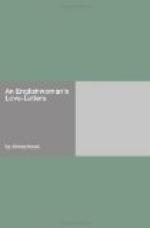LETTER XIV.
Own Dearest: Come I did not think that you would, or mean that you should seriously; for is it not a poor way of love to make the object of it cut an absurd or partly absurd figure? I wrote only as a woman having a secret on the tip of her tongue and the tips of her fingers, and full of a longing to say it and send it.
Here it is at last: love me for it, I have worked so hard to get it done! And you do not know why and what for? Beloved, it—this—is the anniversary of the day we first met; and you have forgotten it already or never remembered it:—and yet have been clamoring for “the letters”!
On the first anniversary of our marriage, if you remember it, you shall have those same letters: and not otherwise. So there they lie safe till doomsday!
The M.-A. has been very gracious and clear after her little outbreak of yesterday: her repentances, after I have hurt her feelings, are so gentle and sweet, they always fill me with compunction. Finding that I would go on with the thing I was doing, she volunteered to come and read to me: a requiem over the bone of contention which we had gnawed between us. Was not that pretty and charitable? She read Tennyson’s Life for a solid hour, and continued it to-day. Isn’t it funny that she should take up such a book?—she who “can’t abide” Tennyson or Browning or Shakespeare: only likes Byron, I suppose because it was the right and fashionable liking when she was young. Yet she is plodding through the Life religiously—only skipping the verses. I have come across two little specimens of “Death and the child” in it. His son, Lionel, was carried out in a blanket one night in the great comet year, and waking up under the stars asked, “Am I dead?” Number two is of a little girl at Wellington’s funeral who saw his charger carrying his boots, and asked, “Shall I be like that after I die?”
A queer old lady came to lunch yesterday, a great traveler, though lame on two crutches. We carefully hid all guide-books and maps, and held our peace about next month, lest she should insist on coming too: though I think Nineveh was the place she was most anxious to go to, if the M.-A. would consent to accompany her!
Good-by, dearest of one-year-old acquaintances! you, too, send your blessing on the anniversary, now that my better memory has reminded you of it! All that follow we will bless in company. I trust you are one-half as happy as I am, my own, my own.
LETTER XV.
You told me, dearest, that I should find your mother formidable. It is true; I did. She is a person very much in the grand pagan style: I admire it, but I cannot flow in that sort of company, and I think she meant to crush me. You were very wise to leave her to come alone.
I like her: I mean I believe that under that terribleness she has a heart of gold, which once opened would never shut: but she has not opened it to me. I believe she could have a great charity, that no evil-doing would dismay her: “stanch” sums her up. But I have done nothing wrong enough yet to bring me into her good graces. Loving her son, even, though, I fear, a great offense, has done me no good turn.




